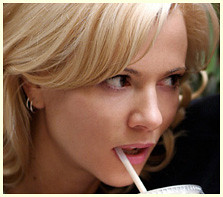“It’s not feminism you need. It’s a new eating regime,” proclaims the headline of an article from SHAPE Magazine (March 2000, here) that touts the “raw food” movement.
Tonight I had my first-ever vegan, raw-food restaurant experience at Pure Food and Wine on Irving Place near NYU. On the way to dinner, my enlightened friends explained that the idea behind raw food is that cooking food at a temperature greater than 118 or 120 degrees eliminates important enzymes from food. The body needs those enzymes as a life force, the raw foodies explain. Yes, there’s the tricky fact that “[m]ost physiologists would cringe at the raw food theory, especially because digestion is a scientifically proven process that depends on enzymes that the body generates, and not food enzymes,” according to this article from CNN. But if raw food could be the solution to gender inequality (after all, “[i]t’s not feminism you need”), I was eager to investigate.
News flash: Based on my one tiny data point of experience, I don’t think “the raw lifestyle” will save women (or men) time any time in preparing food. It turns out that the whole raw food preparation is a tad more complicated than grabbing an apple from the refrigerator. The restaurant’s dishes — involving lots of mushrooms — were elaborate, flavorful, and, well, complicated. Gender equality will not come in the form of creamy cauliflower samosas, no matter how tasty.

 After dinner, I browsed the restaurant’s website and the companion site advertising “everything for the ultimate & raw organic lifestyle.” There was no shortage of photos of the proprietor, Sarma Melngailis, in a variety of semi-seductive poses, such as above. One can click through to “Sarma Raw,” the proprietor’s blog. The association of food and sex is nothing new (that scene in the 1985 film Tampopo definitely made an impression on me). But my first experience of raw food dining gives me a new perspective on Claude Levi-Strauss’s The Raw and the Cooked (1970), in which he associated cooked food with culture, and raw food with the absence of culture. There was culture in abundance in this raw food. I suppose I would be just another joyless feminist if I didn’t appreciate a little sex with my culture.
After dinner, I browsed the restaurant’s website and the companion site advertising “everything for the ultimate & raw organic lifestyle.” There was no shortage of photos of the proprietor, Sarma Melngailis, in a variety of semi-seductive poses, such as above. One can click through to “Sarma Raw,” the proprietor’s blog. The association of food and sex is nothing new (that scene in the 1985 film Tampopo definitely made an impression on me). But my first experience of raw food dining gives me a new perspective on Claude Levi-Strauss’s The Raw and the Cooked (1970), in which he associated cooked food with culture, and raw food with the absence of culture. There was culture in abundance in this raw food. I suppose I would be just another joyless feminist if I didn’t appreciate a little sex with my culture.
-Bridget Crawford

